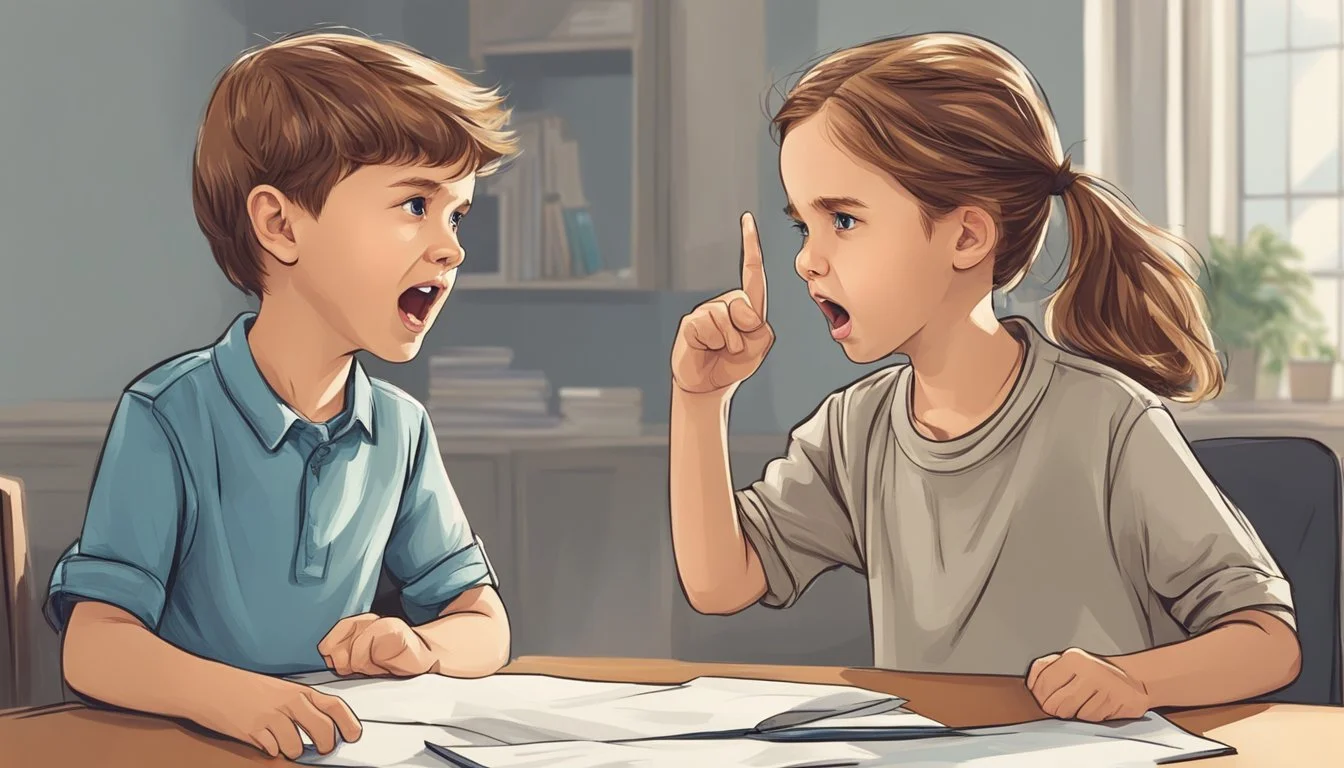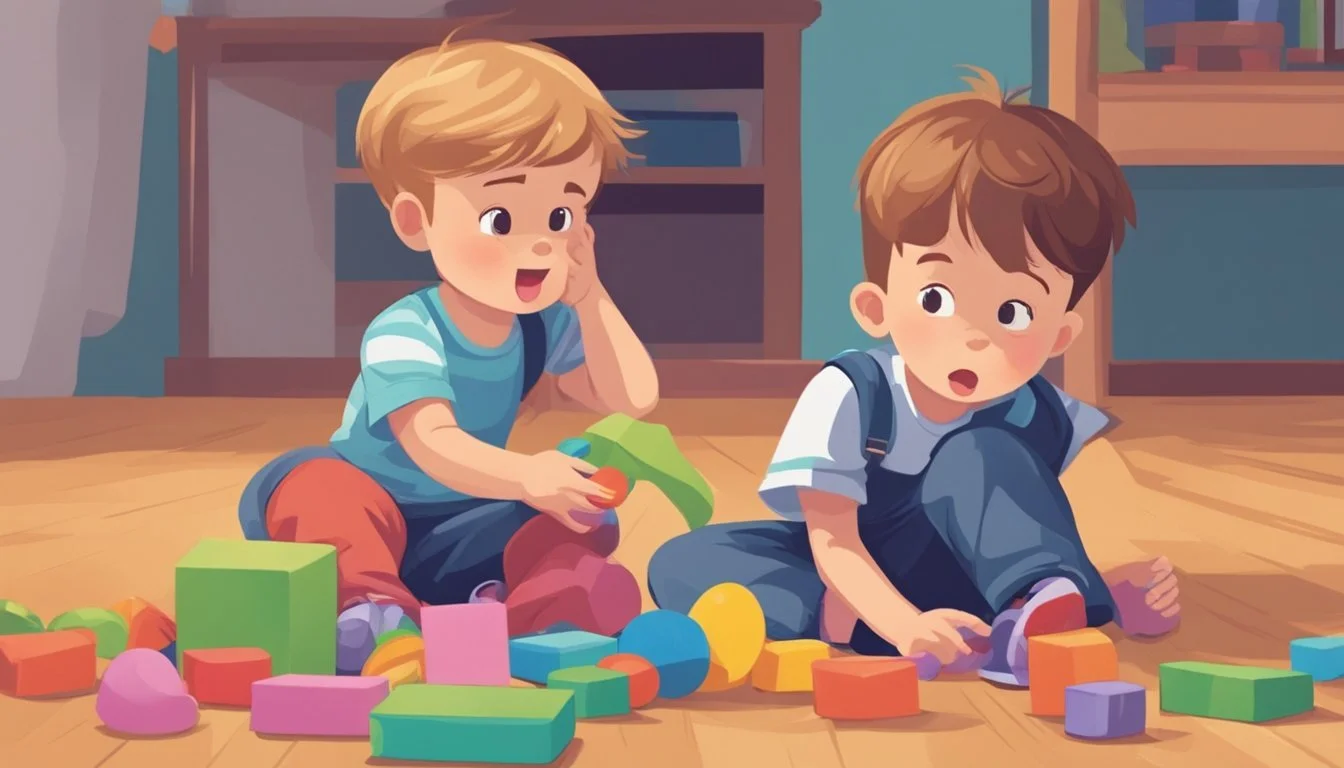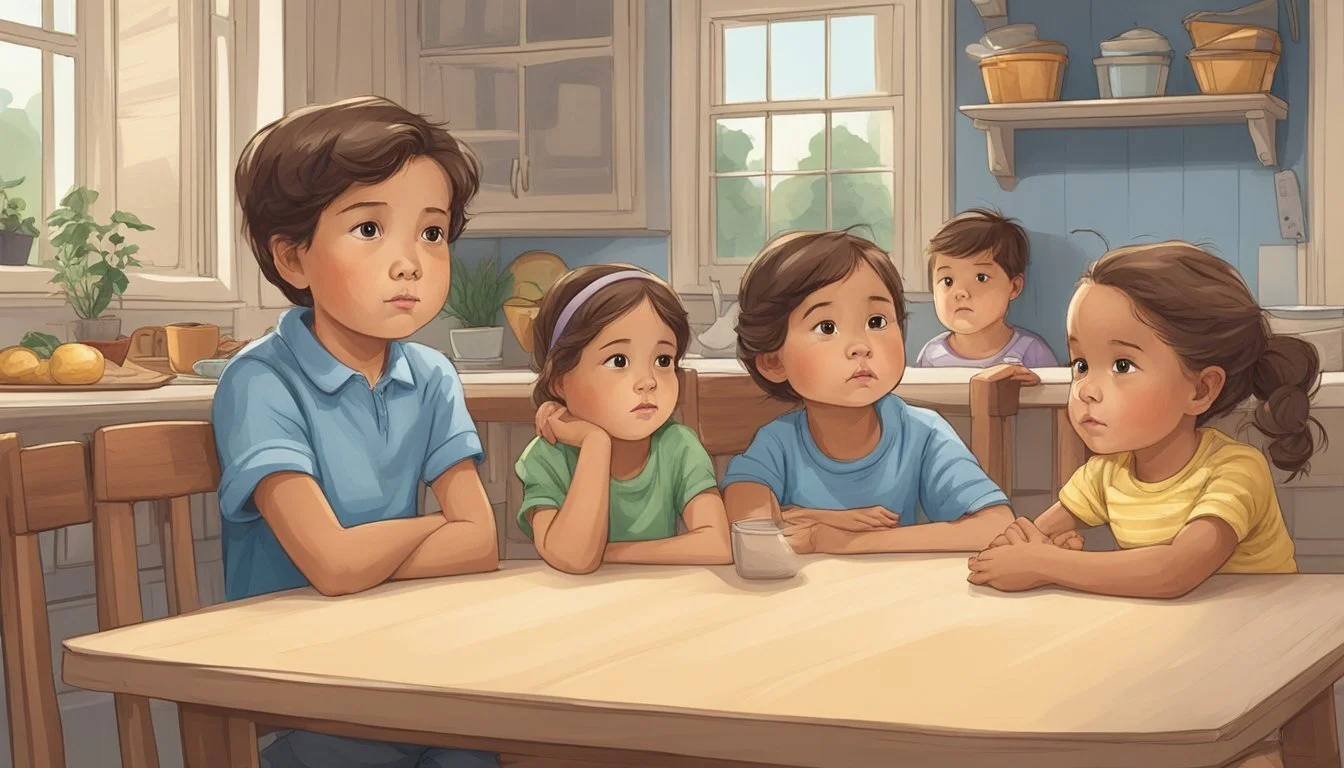12 Characteristics of Emotionally Immature Siblings
Key Traits to Recognize
Understanding the behaviors of siblings can be a complex and nuanced task, especially when dealing with emotional immaturity. Siblings who lack emotional maturity often exhibit traits that can disrupt family harmony and create persistent conflicts. Identifying these characteristics is crucial for fostering healthier relationships and addressing issues constructively.
What makes understanding these behaviors important is the ability to foster more empathetic and supportive relationships within the family. Recognizing and addressing emotional immaturity can improve communication, reduce conflicts, and promote a more cohesive family unit. By delving into these characteristics, one can gain valuable insights into the dynamics at play and work towards more positive interactions.
1) Blames Others Constantly
Emotionally immature siblings often shift responsibility away from themselves. This behavior allows them to avoid accountability and maintain a sense of control. When conflicts arise, they frequently point fingers rather than acknowledging their role.
This constant blaming can strain relationships. Those on the receiving end may feel unfairly targeted and misunderstood. It disrupts healthy communication and makes conflict resolution challenging.
Criticism or problems are met with defensiveness. They often react by accusing others instead of introspecting. This pattern hinders personal growth and mutual understanding within the family. Recognizing this trait is crucial for addressing deeper issues.
2) Avoids Difficult Conversations
Emotionally immature siblings often shy away from challenging discussions.
When conflicts arise, they might deny their role in the problem or become defensive, rather than engaging in meaningful dialogue. This avoidance prevents resolution and can lead to unresolved issues festering over time.
In professional settings, emotionally immature individuals struggle to address conflicts directly. They may dismiss the importance of the issue or attempt to shift the focus elsewhere. This behavior creates a dysfunctional environment and hinders productive communication.
These individuals may also use deflection tactics. For example, they might change the subject or shift the blame during difficult conversations. This evasion can cause frustration for those trying to address important matters.
Emotionally immature siblings find it challenging to face emotional discomfort. They often prefer short-term peace over long-term solutions, choosing to avoid the root of the problem. This tendency can impede personal growth and strain relationships.
Addressing these issues requires patience and consistent effort from the other party. Encouraging open and honest communication is essential for breaking this pattern of avoidance.
For more on recognizing and dealing with emotional immaturity, refer to Healthline.
3) Has Trouble Apologizing
Emotionally immature siblings often find it difficult to apologize. They may struggle with acknowledging their mistakes or wrongdoings. This can stem from a fear of appearing weak or from an inability to accept responsibility for their actions.
Instead of offering a sincere apology, they might deflect blame or make excuses. They might say things like, "It's not my fault," or "You made me do it." This evasion can be frustrating and hurtful for those seeking resolution.
In some cases, they might avoid the topic altogether, hoping the issue will be forgotten. This can create lingering tension and unresolved conflicts within the family dynamic.
Their reluctance to apologize can also be linked to a lack of empathy. They may not fully grasp or acknowledge the impact of their actions on others.
Without a proper apology, emotional wounds can fester. This behavior indicates a need for personal growth and development in their emotional maturity.
For a deeper dive into the psychology behind emotionally immature behavior, Psych Central offers some insights into these patterns.
4) Seeks Excessive Attention
Emotionally immature siblings often crave constant attention. They might interrupt conversations or engage in dramatic behaviors to ensure all eyes are on them.
Such siblings can become easily upset if they feel ignored. This need for attention often points to deeper insecurities.
In families, this behavior can create tension. The craving for attention disrupts normal interactions and makes shared experiences uncomfortable.
5) Struggles with Empathy
Emotionally immature siblings often have difficulty understanding and sharing the feelings of others. This can manifest as a lack of concern for how their actions may affect those around them.
They may find it challenging to step into someone else’s shoes. This means they could frequently misunderstand or minimize others' emotions.
During conversations or conflicts, they might display insensitive or self-centered behavior. This lack of empathy makes it hard for them to form deep, meaningful connections with family members.
Emotionally immature siblings often fail to provide the emotional support that is crucial in relationships. Their inability to relate emotionally can lead to feelings of isolation and frustration among their siblings.
In social situations, these individuals may come off as detached or uninterested. This further hampers their ability to build or maintain close relationships within the family.
Their struggle with empathy also means they may not readily offer comfort or understanding during difficult times. This can create a sense of emotional distance between them and their siblings.
Understanding the signs can help in addressing the emotional gaps. For example, the article on emotionally immature adults highlights the difficulty such individuals have in relating to others' feelings effectively.
6) Acts Impulsively
Emotionally immature siblings often act without thinking through the consequences. They make hasty decisions in moments of heightened emotions, leading to regretful actions.
This impulsive behavior can manifest in many ways, such as making unplanned purchases or engaging in risky activities. It reflects a lack of self-control and foresight.
They may also interrupt conversations or react explosively to minor annoyances. This inability to delay gratification indicates a struggle to manage their emotional responses effectively.
Sometimes, they may apologize sincerely afterward, yet repeat the behavior. This cycle highlights deeper issues with emotional regulation and impulse control.
In social interactions, their impulsiveness can strain relationships. Friends and family might perceive them as unpredictable or unreliable.
It's crucial to note that impulsivity isn't just a lack of discipline. It often signals underlying emotional struggles that need addressing.
7) Difficulty Handling Stress
Emotionally immature siblings often struggle with managing stress effectively.
They may react to stress with significant mood swings, displaying irritation or withdrawal. Such behaviors indicate an inability to cope with pressure in a balanced manner.
Stressful situations can lead to impulsive decisions, further complicating everyday interactions. This lack of composure can strain relationships.
Instead of addressing issues calmly, they may resort to denial or blaming others.
When faced with challenges, these individuals might avoid responsibility, leaving others to manage the fallout. This avoidance only exacerbates the problem.
Emotionally immature siblings might also exhibit physical symptoms like headaches or stomachaches when stressed. This psychosomatic response underscores their struggle to handle pressure healthily.
Ineffective stress management can manifest through escapism, such as excessive screen time or substance use. These coping mechanisms are temporary and often harmful.
Constructive communication about stress can be challenging, as they might not be open to discussing their feelings. This barrier limits mutual understanding.
For more on related behaviors, see Signs and Ways to Help Loved Ones.
8) Lacks Self-Reflection
Emotionally immature siblings often show a marked lack of self-reflection. They struggle to look inward and assess their own actions or behavior. This lack of introspection can prevent them from recognizing their role in conflicts or issues.
They may also fail to take responsibility for their actions. Instead of acknowledging mistakes, they might blame others or make excuses.
Without self-reflection, personal growth is hindered. They are less likely to learn from their experiences and improve their interactions with others. This can lead to repeated patterns of behavior that strain relationships.
Emotionally immature individuals may also lack the ability to understand how their actions affect others. This can lead to inconsiderate or selfish behavior, further impacting their relationships negatively.
Encouraging an emotionally immature sibling to engage in self-reflection can be challenging. It requires patience and a supportive approach. Providing constructive feedback without judgment may help them start to see the value in examining their own behavior.
Without this essential skill, emotionally immature siblings might continue to struggle with interpersonal relationships. Recognizing the signs and encouraging self-improvement can be beneficial for both them and their loved ones.
9) Is Often Defensive
Emotionally immature siblings frequently exhibit defensiveness. This trait is characterized by a tendency to avoid responsibility by deflecting blame onto others. They may react to criticism with anger, denial, or avoidance, making it difficult to address issues directly.
Defensive behavior typically stems from a deep-seated fear of vulnerability. When feeling threatened, these siblings are quick to build emotional walls and reject any perceived negative feedback. This reaction protects their fragile self-esteem.
In conflicts, they are inclined to minimize their role and exaggerate the faults of others. Instead of engaging in open dialogue, they may shift the focus away from themselves. This makes constructive conversation challenging.
Their defensiveness can also manifest as stonewalling, effectively shutting down communication. This leaves others feeling unheard and unresolved tensions simmering. This pattern can damage relationships over time.
Recognizing these defensive behaviors is the first step in addressing them. It's crucial to approach them with empathy and patience, helping them feel safe enough to lower their emotional defenses. Establishing a supportive environment can encourage more open and honest interactions.
10) Rarely Takes Responsibility
Emotionally immature siblings often exhibit a reluctance to accept responsibility for their actions. This behavior can manifest in various ways, such as blaming others for their mistakes or refusing to acknowledge their role in conflicts. This tendency can create a challenging family dynamic.
When confronted, they may deflect or shift blame to avoid facing the consequences. This lack of accountability can hinder personal growth and damage relationships. It is common for friends and family to feel frustrated and exhausted by these patterns.
These siblings may also show an unwillingness to apologize or make amends. They often rationalize their actions to avoid feeling guilt or shame. As a result, trust and mutual respect within the family can erode over time.
Addressing this issue involves clear communication and setting boundaries. Encouraging them to reflect on their behavior and its impact can be a crucial first step. Conversations about responsibility should be approached with empathy but firmness to foster a healthier interaction.
Avoiding enabling behaviors and maintaining consistent expectations can also help mitigate this challenge. Recognizing the signs early and seeking appropriate support can make a significant difference in managing emotionally immature behavior effectively. For more insights, refer to Verywell Health.
11) Prioritizes Immediate Gratification
Emotionally immature siblings often prioritize immediate gratification over long-term benefits. They seek quick emotional rewards and may show impatience when results are not instantaneous. This behavior is evident when they make impulsive decisions without considering the long-term consequences.
In financial matters, for example, they might spend money recklessly rather than saving for future needs. This can lead to financial instability and frequent monetary issues. They might buy items impulsively, driven by a desire for instant pleasure.
Emotionally immature individuals also tend to struggle with delayed gratification in relationships. They might demand immediate attention and neglect the importance of patience and understanding in maintaining healthy connections. This can cause tension and conflict with others who have more balanced expectations.
Professionally, these siblings may jump from job to job, seeking positions that offer quick rewards or recognition. They often lack the perseverance to stick with long-term career goals and projects, resulting in a scattered and unstable career path.
The tendency to prioritize immediate gratification often intertwines with other traits of emotional immaturity, such as egocentrism and poor impulse control. By focusing on short-term gains, they inadvertently sabotage their own growth and stability. Behaviors such as avoiding accountability for their actions are prevalent, as described by the Cycle Breaking Therapist. This causes frustration for those around them who value thoughtful and measured decision-making.
12) Expects Others to Cater to Their Needs
Emotionally immature siblings often expect others to cater to their needs. They may regularly seek attention and assistance in situations they could handle independently.
This behavior can manifest in various ways. They might frequently demand emotional support without reciprocating or expect others to adjust schedules or plans to accommodate them.
Such siblings often lack an understanding of mutual give-and-take in relationships. They may also show little appreciation for the efforts others make on their behalf. Instead, they feel entitled to special treatment.
These expectations can strain relationships. Constantly catering to their needs can create feelings of frustration and resentment among family members, leading to potential conflicts.
To address this, it’s important for family members to set clear boundaries. Encouraging emotionally immature siblings to take responsibility for their actions can help them develop greater independence and awareness of others' needs.
Fostering open communication can also be beneficial. Discussing how their behavior impacts others can lead to more balanced and respectful relationships.
Such interventions can gradually help emotionally immature siblings grow and develop healthier interaction patterns. For further details, you can refer to traits of emotionally immature individuals.
Understanding Emotional Immaturity
Emotional immaturity manifests through difficulty in managing emotions and maintaining healthy relationships. Various factors contribute to this, including upbringing, psychological issues, or environmental influences.
Definition and Characteristics
Emotional immaturity refers to the tendency of an individual to respond to situations and process emotions in ways that are inappropriate for their age. Key characteristics include selfishness, poor communication skills, and an inability to engage in serious conversations. Such individuals may avoid challenging discussions or make jokes during emotionally intense moments.
They often react impulsively, struggle to understand others' feelings, and exhibit excessive emotional responses. This behavior can lead to strained relationships, as emotionally immature people may focus more on their own needs without considering the impact on others.
Causes of Emotional Immaturity
Several factors contribute to the development of emotional immaturity. One primary reason is upbringing; children who do not receive adequate emotional support or modeling from their parents may not learn to manage their emotions effectively.
Psychological conditions such as certain personality disorders or mental health issues can also hinder emotional development. For instance, emotionally immature parents might struggle with acknowledging and processing their own emotions, passing these behaviors onto their children.
Environmental factors like trauma or prolonged stress can also impact emotional growth. People exposed to consistent stress or emotional neglect may develop coping mechanisms that prevent them from maturing emotionally. Recognizing these causes is vital to addressing and helping individuals grow emotionally.
Impact on Relationships
Emotionally immature siblings can significantly impact family dynamics and create communication challenges that persist into adulthood. These influences can lead to strained relationships and difficulty in forming healthy emotional connections.
Family Dynamics
Emotionally immature siblings often contribute to dysfunctional family dynamics. They may exhibit behaviors such as seeking constant attention, creating unnecessary drama, or avoiding responsibilities. These actions can create an imbalance, where other family members feel the need to compensate or take on additional roles to maintain harmony.
In some cases, the presence of an emotionally immature sibling can lead to roles being reversed, with more responsible siblings stepping into parental roles. This dynamic can lead to resentment and strain relationships further, making it challenging for the family to operate cohesively.
Moreover, emotionally immature siblings may fail to support their family members during difficult times, leading to feelings of isolation and neglect. The lack of reliable emotional support can exacerbate family tensions and diminish the sense of unity within the household.
Communication Challenges
Emotionally immature siblings often struggle with effective communication. They may have difficulties expressing their needs and emotions clearly, leading to misunderstandings and conflicts. Their inability to engage in constructive conversations can hinder problem-solving and exacerbate disagreements.
These individuals may also resort to manipulative communication tactics, such as guilt-tripping or passive-aggressive behavior. Such tactics can frustrate others and create a hostile environment where open and honest dialogue is nearly impossible.
Additionally, emotionally immature siblings might avoid addressing issues directly, preferring to ignore problems or deflect responsibility. This avoidance can cause issues to fester and grow, leading to long-term breakdowns in communication and trust.
Ultimately, the presence of emotionally immature siblings in a family can create significant barriers to healthy relationships, making it crucial to address these dynamics proactively.












